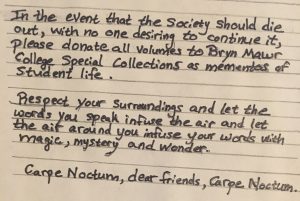I was hoping to write this blog post about how I was starting to do deeper research in the archives, but a really interesting phenomenon has come up again and again while I’ve been casually mentioning this project to people—a kind of embarrassed, covert investment in the subject, with helpful leads and research passed on on the sly. This has ranged everywhere from a text from a family member who shyly admitted that she played Dungeons & Dragons in high school around the time period I’m looking at, to one of my close friends who graduated excitedly shouting over the phone to me that she knows who’s been Maydayed the Doublestar “Lackey Handbook” and how they would be a great resource even though this is supposed to be a secret lineage, to sitting down with a professor in a completely different field who mentions offhandedly that she’s written academic papers on “Capie” culture on campus and how it relates to her larger academic discipline. There’s something really interesting about the way that the knowledge of involvement in fantasy roleplay on campus is really widespread but almost subterranean. It seems like the main mystique of this type of campus culture is its secrecy and the way it’s passed by word of mouth between those in the know.
So far, the shape of this project has been really defined by information passed on to me from interested parties. In a sense, the study of this topic mirrors its contents: a close knit community that welcomes those who know about it, but are hesitant to mention their investment unprompted. It might just be because we aren’t too far out from the time that this campus culture was active and pervasive, or it might just be a marker of studies of groups of self-proclaimed outsiders. Not to sound like a broken record from last week, but it’s again that theme of wanting to be a part of a network of figures, but this time there’s also the fear of not wanting to be shamed for it, not wanting to be considered on the very fringes that they’re looking at under a microscope.
-Beck Morawski ’21
